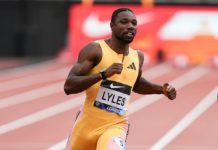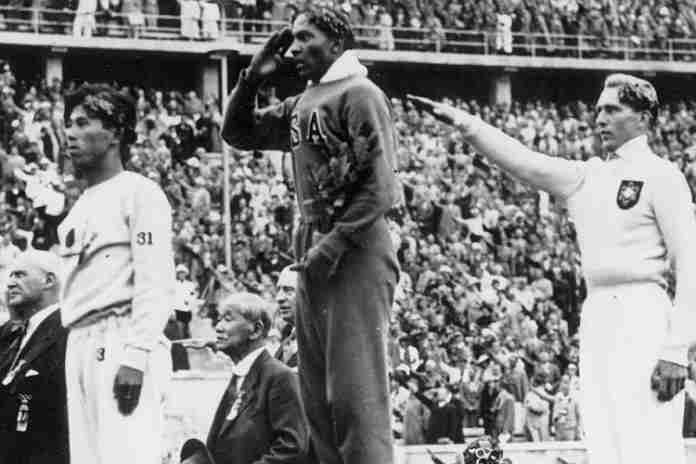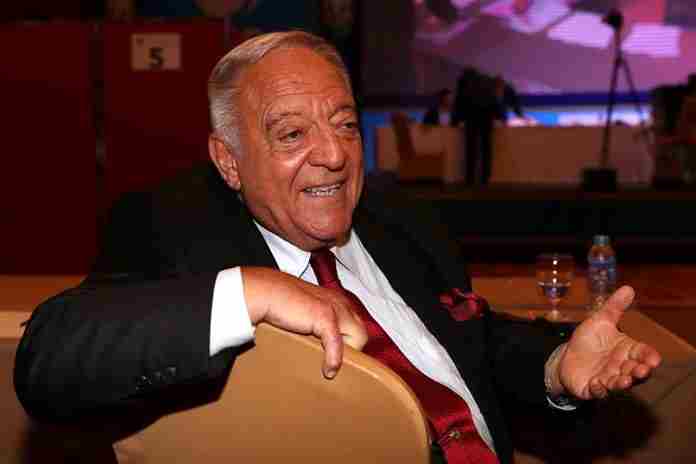“The IOC’s current position is very clear in regards to protest. Whether you agree or not, and choose to follow the rules, will be with the athletes. It is very unclear what the punishment will be for any infringement or what an infringement may look like. Like black and brown people in America it’s unclear how the rules will apply to them and fear is the order of the day.”
That’s from a very carefully composed, four-page letter posted on Twitter (full text here) entitled “Sport, Politics, Protest and the Olympics,” written by Gwen Berry, at the center of the American athlete-protest swirl in the aftermath of the killing of George Floyd by a (now-ex) Minneapolis police officer.
Remember that Berry, the 2019 Pan American Games gold medalist in the women’s hammer, raised her fist on the victory stand in Lima, Peru last August during the playing of the U.S. national anthem, reminiscent of the 1968 Olympic protest of Tommie Smith and John Carlos during the awards ceremony for the men’s 200 m.
She told Nancy Armour of USA Today afterwards, “It’s too important to not say something. Something has to be said. If nothing is said, nothing will be done, and nothing will be fixed, and nothing will be changed.”
Berry was placed on probation by the United States Olympic and Paralympic Committee afterwards, noting that her actions had broken the written agreement – required from all participants – to abide by the rules of the Pan Am Games, which also prohibits podium protests.
Berry’s letter continues:
“Ultimately, the rules are designed to ensure governments and private investors continue to support future Olympics and the IOC’s own survival.
“Athletes aren’t stupid, and the sacrifices they and their supporters, have had to make for the 10 or more years of training, to make the Olympics, can never be repaid.
“To suggest that sport and politics should not or are not part of the Olympics and that life is about free and fair play is demeaning and disrespectful.
“Rule 50 is a step backwards to 1968 where protesting athletes were stripped of their medals and thrown out of the games, protesting for causes which even the IOC admits now are legitimate.
“I expect the IOC will continue to prioritize political relationships, profits and their own existence over the rights and freedom of athletes.
“Despite these barriers, I am determine [sic] to work as hard as I can to make things better for the black and brown communities in the United States. My protest and sacrifice will not have been for nothing. The issues we face are too important to be ignored.”
(Fact check: Smith and Carlos were expelled from the U.S. team after their protest, but their medals were not taken away and they remain the gold and bronze medalists in the ‘68 men’s 200 m.)
Her reference is to Rule 50 of the Olympic Charter (2019 edition); section 2 states:
“No kind of demonstration or political, religious or racial propaganda is permitted in any Olympic sites, venues or other areas.”
In the aftermath of protests by Berry and American fencer Race Imboden during their Pan Am Games victory ceremonies last year, as well as protests by swimmers Mack Horton (AUS) and Duncan Scott (GBR) during victory ceremonies with alleged doper (and now suspended) Yang Sun of China during the 2019 FINA World Aquatics Championships, the IOC asked its Athletes Commission to create a set of Rule 50 guidelines to clarify the rules for the upcoming Tokyo Games.
That document was issued in February and included:
“Where are protests and demonstrations not permitted during the Olympic Games?
“• At all Olympic venues, including:
“o On the field of play
“o In the Olympic Village
“o During Olympic medal ceremonies
“o During the Opening, Closing and other official Ceremonies
“• Any protest or demonstration outside Olympic venues must obviously comply with local legislation wherever local law forbids such actions.
“During the Olympic Games, where do athletes have the opportunity to express their views?
“While respecting local laws, athletes have the opportunity to express their opinions, including:
“• During press conferences and interviews, i.e. in the mixed zones, in the International Broadcasting Centre (IBC) or the Main Media Centre (MMC)
“• At team meetings
“• On digital or traditional media, or on other platforms.
“It should be noted that expressing views is different from protests and demonstrations. It should be noted, too, that these guidelines are also applicable to any other accredited person (trainers, coaches, officials, etc.).”
Since then, there have been varying opinions from current and former athletes from multiple countries about the right to speak out vs. the appropriateness of using the Olympic podium.
This may be exactly the right time to hear them, but in a high-profile, live event.
● With the Olympic Games postponed until 2021, isn’t this the right time to ask American athletes to create their own concept of Rule 50 and to re-write the rule and the Rule 50 Guidelines issued by the IOC’s Athletes Commission into a form they feel is appropriate?
● This can be done at a conference in an easy-to-access, middle-of-the-country city such as Denver or Chicago, starting with the Athletes Advisory Council members for each sport, and adding those who wish to participate such as Berry. Arrange the event in a large ballroom and keep the coronavirus-induced social-distancing requirements in place as needed.
● Live-stream the entire proceedings, and if done over Labor Day or a similar holiday weekend, significant parts can be carried over national outlets such as the cable news channels and C-SPAN. The texts of all remarks should be published.
● The drafting of new rules and guidelines can be assisted by any of the many lawyers who are already deeply involved in athlete’s issues in the U.S. And there needs to be an expert in the intricacies of the Ted Stevens Olympic and Amateur Sports Act present to review compliance with federal law.
● Deliver the completed, proposed revision to IOC President Thomas Bach (GER) in a ceremony in Lausanne the following week.
Sound easy? Putting on the event is the easy part, and not that expensive. The hard part is composing a rule and regulations which will actually work.
Simply saying that any form of protest is acceptable at any time sounds like an easy solution. But would Smith, Carlos, Berry and Imboden appreciate:
● A Nazi salute during an awards ceremony? That’s what happened during the 1936 Berlin Games; while Jesse Owens was saluting the American flag during the long jump awards ceremony, Luz Long was giving the Hitler salute (pictured above). How about an entire delegation marching in and giving such a salute? The French team did in 1936; they were conquered four years later.
● Someone pulling on a Ku Klux Klan hood during a national anthem?
● How about an Iranian medalist wearing t-shirt emblazoned with “Death to America” and/or “Death to Israel” or a similar sentiment?
You can expand this list infinitely with other domestic political statements from the other 200 nations which attend the Games. What are the boundaries? If there are none, are there no actions to be considered offensive?
Even in the U.S., our right of free speech actually has some limits. But for Berry and others to really be heard, they should have a national platform to do so and have the opportunity to present their formulation to the International Olympic Committee, (much) sooner rather than later.
Rich Perelman
Editor
You can receive our exclusive TSX Report by e-mail by clicking here. You can also refer a friend by clicking here.




























